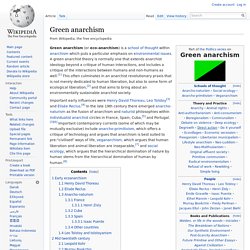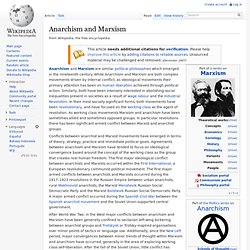

Ricky Prewitt
Newest Web Explorations. Gatherings. A Basket of Things. Apple Trees. How to Build a Square Foot Garden. Update!

Check out our new Square Foot Gardening Infographic for even more tips, diagrams, a plant list and much more. I recently stumbled upon a book (All New Square Foot Gardening: Grow More in Less Space! By Mel Bartholomew) with an interesting gardening method called square foot gardening, and decided we would give it a try. Ancient dwellings glastonbury. Social anarchism. Libertarian socialists believe in converting present-day private property into the commons or public goods, while retaining respect for personal property.[4] Social anarchism is used to specifically describe tendencies within anarchism that have an emphasis on the communitarian and cooperative aspects of anarchist theory and practice.

Social anarchism is generally considered an umbrella term that includes (but is not limited to) anarcho-collectivism, anarcho-communism, anarcho-syndicalism, and social ecology. How a Libertarian Capitalist Became a Libertarian Socialist. Republished from world.std.com By Chris Wilson A couple years back when I was working toward a philosophy major in college, I wrote a rebuttal on the section of The Anarchist FAQ that covers anarcho-capitalism.

I removed the rebuttal from the web because I didn't have the time or inclination to continue to maintain it or expand upon it. Three years later, I've come to find myself disagreeing with my old rebuttals and agreeing with the FAQ. What follows is my story. Green anarchism. Green anarchism (or eco-anarchism) is a school of thought within anarchism which puts a particular emphasis on environmental issues.

A green anarchist theory is normally one that extends anarchist ideology beyond a critique of human interactions, and includes a critique of the interactions between humans and non-humans as well.[1] This often culminates in an anarchist revolutionary praxis that is not merely dedicated to human liberation, but also to some form of ecological liberation,[2] and that aims to bring about an environmentally sustainable anarchist society. Early ecoanarchism[edit] Henry David Thoreau[edit] Endgame (Derrick Jensen books) Endgame is a two-volume work by Derrick Jensen, published in 2006, which argues that civilization is inherently unsustainable and addresses the resulting question of what to do about it.

Volume 1, The Problem of Civilization, spells out the need to immediately and systematically destroy civilization. Volume 2, Resistance, is about the challenging physical task that dismantling civilization presents. Jensen begins with a list of 20 premises, the most concise encapsulation of his ideas published to date (see them in their entirety below).[1] However, the bulk of the work is not written in such a highly structured, academic style.
As in his previous books, A Language Older Than Words and The Culture of Make Believe, Jensen uses the first-person, interweaving personal experiences with cited facts to construct his arguments. Individualist anarchism. Overview[edit] Individualist anarchism of different kinds have a few things in common.

These are: 1. The concentration on the individual and his/her will in preference to any construction such as morality, ideology, social custom, religion, metaphysics, ideas or the will of others.[9][10] Free-market anarchism. The term may be used to refer to diverse economic and political concepts, such as those proposed by anarchist libertarian socialists like Pierre-Joseph Proudhon, Benjamin Tucker, and Lysander Spooner,[1][2][3][4] or alternatively anarcho-capitalists like Murray Rothbard[5] and David D.

Friedman.[6] The ideology in favor of capitalism has ancestry in the laissez-faire ideas of Julius Faucher and Gustave de Molinari.[7][8] History[edit] Gustave de Molinari was one of the first to discuss competition in security. One of the first individuals to propose the concept of market protection of individual liberty and property was France's Jakob Mauvillon in the 18th century. [citation needed] Later, in the 1840s, Julius Faucher and Gustave de Molinari advocated the same.
Internal disputes[edit] Murray Rothbard and other natural rights theorists cite the non-aggression axiom as the basis for their libertarian systems, while other free-market anarchists such as David D. Compost toilet. Anarchism and Marxism. Anarchism and Marxism are similar political philosophies which emerged in the nineteenth century.

While Anarchism and Marxism are both complex movements driven by internal conflict, as ideological movements their primary attention has been on human liberation achieved through political action. Similarly, both have been intensely interested in abolishing social inequalities present in societies as a result of wage labour and the Industrial Revolution. In their most socially significant forms, both movements have been revolutionary, and have focused on the working class as the agent of revolution. Anarchy memes. Worker Owned Companies. How a Libertarian Capitalist Became a Libertarian Socialist. Are "Anarcho"- Capitalists Really Anarchists? Republished from infoshop.org By Anarchist F.A.Q.

In a word, no. While "anarcho"-capitalists obviously try to associate themselves with the anarchist tradition by using the word "anarcho" or by calling themselves "anarchists" their ideas are distinctly at odds with those associated with anarchism. As a result, any claims that their ideas are anarchist or that they are part of the anarchist tradition or movement are false. "Anarcho"-capitalists claim to be anarchists because they say that they oppose government. As noted in the last section, they use a dictionary definition of anarchism.
Part of the problem is that Marxists, like many academics, also tend to assert that anarchists are simply against the state. "Critics have sometimes contended that anarchist thought, and classical anarchist theory in particular, has emphasised opposition to the state to the point of neglecting the real hegemony of economic power. Hoppe prefers monarchy to democracy, considering it the superior system. Anarchy. Ancient stilt dwellings glastonbury. Forest garden. Ransom bottle tower garden. How to make a willow fence.
30+ Things To Do With Eggshells.